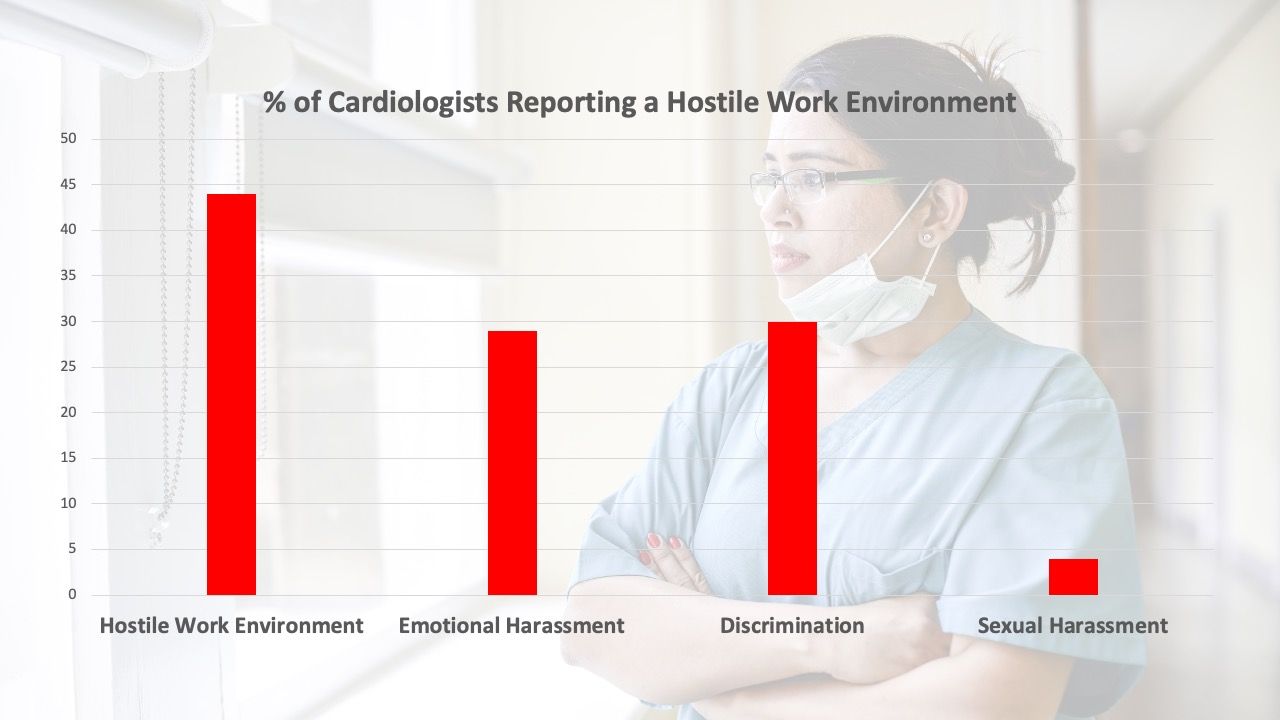Survey Suggests Nearly 50% of Cardiologists Report Having a Hostile Work Environment
An analysis of survey data from cardiologists in multiple regions throughout the world portrays a field in need of reform, with more than 4-in-10 reporting a hostile work environment and some form of discrimination reported by 3-in-10 cardiologists.
This article is the first in a series from Practical Cardiology taking a deeper look at professionalism and ethics within cardiology after the release of a report from the American Heart Association/American College of Cardiology Consensus Conference on Professionalism and Ethics.
Analysis of survey responses of cardiologists from across the globe underlines the need for reform in the field.
Using responses from nearly 6000 cardiologists, investigators found 44% of cardiologists reported having a hostile work environment with 29% reporting emotional harassment, 30% reporting discrimination, and 4% reporting sexual harassment.
“Our study demonstrates a high prevalence of reported hostile work environment in cardiology. Although there is some geographic, gender, and race variation, no region, gender, or race is immune,” wrote investigators.
Led by Laxmi Mehta, MD, Vice Chair of Wellness for the Department of Internal Medicine at the Ohio State University Wexner Medical Center and Chair of the ACC’s Task Force on Clinician Well-Being, the current study was an analysis of data from a 50-item online survey returned by 5931 cardiologists around the world between September 13, to October 22, 2019. In total, 71,022 cardiologists were sent survey invitations. Among those who responded, 77% were men, 54% were white, and 73% were 54 years of age or older.

As mentioned above, a hostile work environment was reported by 44% of respondents. Upon analysis, higher rates were observed among women versus men (68% vs 37%; OR, 3.58; 95% CI, 3.14-4.07), Black cardiologists versus White cardiologists (53% vs 43%; OR, 1.68; 95% CI, 1.25-2.26), and North American cardiologists compared to South American cardiologists (54% vs 38%; OR, 1.90; 95% CI, 1.51-2.41).
When assessing individual aspects of hostile work environments, results indicated emotional harassment was reported by 29% (n=1743) of cardiologists, while 30% (n=1750) reported experiencing discrimination and 4% (n=221) reported experiencing sexual harassment. Investigators pointed out reports of emotional harassment (43% vs 26%), discrimination (56% vs 22%), and sexual harassment (12% vs 1%) were more common among women cardiologists than men.
Hear from Laxmi Mehta, MD, on the impact of COVID-19 on burnout among cardiologists.
Further analysis indicated gender was the most common cause of discrimination, accounting for 44% of reports. Other common causes included age (37%), race (24%), religion (15%), and sexual orientation (5%). In a multivariable analysis, results suggested women (OR, 3.39; 95% CI, 2.97-3.86; P <.001) and cardiologists early in their career (OR, 1.27; 95% CI, 1.14-1.43; P <.001) had the greatest odds of experiencing a hostile work environment.
“A renewed focus on organizational structure, processes, and practices to mitigate hostile work environments across the globe in cardiology is critical to ensuring workforce well-being and optimal patient care,” wrote investigators.
This study, “Global Prevalence and Impact of Hostility, Discrimination, and Harassment in the Cardiology Workplace,” was published in the Journal of the American College of Cardiology.